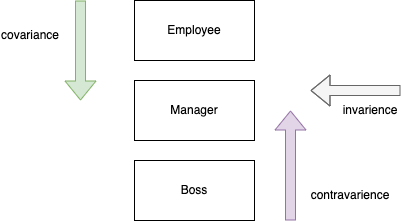Covariance in type checking
Variance in mypy errors always confused me. I decided to dig into this a little and make things more clear for myself.
For the variance to make sense the language has to support inheritence or types extension.
Let's take off from an example from mypy page
from typing import Callable
class Employee:
any_employee_attr = 0
class Manager(Employee):
some_manager_thing = 1
class Boss(Manager):
some_boss_thing = 2
# E(employee) -> M(anager) -> B(oss)
covariance - down the inheritance Manager is covariant to Employee
contravariant - up the inheritance Manager is contravariant to Boss
invariant - the only class Manager is invariant to itself

Covariance makes more sense in function's arguments
def print_worker_details(worker: Employee):
print(worker.any_employee_attr)
# all below should be valid calls:
print_worker_details(Employee())
print_worker_details(Manager())
print_worker_details(Boss())
Callable is an example of type that behaves contravariant in types of arguments, namely Callable[[Employee], int] is a subtype of Callable[[Manager], int]. To understand this, consider a function:
def salaries(
staff: list[Manager],
accountant: Callable[[Manager], int]
) -> list[int]:
return [accountant(s) for s in staff]
def accountant_E(e: Employee) -> int:
return 100
def accountant_M(m: Manager) -> int:
return 200 * m.some_manager_thing
def accountant_B(b: Boss) -> int:
return 100 * b.some_boss_thing
# Callables are covariant
staff = [Manager()]
salaries(staff, accountant_E) # valid (least specific)
salaries(staff, accountant_M) # valid (mid specific)
salaries(staff, accountant_B) # invalid (most specific)
# note bottom to top order (Employee to Boss)
The idea how I understand it is
"Less specific type should also work as far as inputs are in the same hierarchy".
So each Manager is an Employee too. But I think that a manager would not be happy with a salary he receives...
Lists are mutable, so there is no guarantee that salaries function would not modify the list and add a Manager to the list of Employees that would break the type declaration of the input
So lists are invariant:
bosses = [Boss()]
managers = [Manager()]
employees = [Employee()]
salaries(bosses, accountant_M) # invalid (most specific)
salaries(managers, accountant_M) # valid (mid specific)
salaries(employees, accountant_M) # invalid (least specific)
# note top to bottom order (Boss to Employee)
# the example from docs of mypy is great to show source of danger
class Shape:
pass
class Circle(Shape):
def rotate(self):
...
def add_one(things: list[Shape]) -> None:
things.append(Shape())
my_things: list[Circle] = []
add_one(my_things) # This may appear safe, but...
my_things[0].rotate() # ...this will fail
Now when you see that mypy recommends you to use Sequence instead of a List, now you know why - mutability.
Let us see where invariance has it's use. We want to create a clone function which clones Managers. Sounds like a nice function, isn't it?
def clone(clonee: Manager) -> Manager:
return Manager(clonee)
This may lead to unexpected behaviour, as we did not really plan to make our Boss a manager. So we may want to tell that argument to clone function is invariant.
And I am sure you will figure out yourself how exactly to do that, as you should be right on track in understanding variance.
Hope this article makes things clear. Adios!